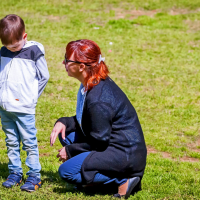Understanding & Caring For Children in Grief

"Children Don't Grieve."
Even among specialists, there was a past misconception that children do not grieve the death of a grandparent, parent, sibling, relative, or friend. This long-held fallacy was based on the idea that children are not intellectually and emotionally developed enough to fathom a concept like death. This idea has been handed down and created a significant dissonance with the truth—children grieve.
The "D" Word
When a family or friend group experiences a death, there is a tendency to soften the blow for children. This softening may exist in the form of altered language. Parents and caregivers may feel tempted only to use words such as "lost," "passed on," or "gone to heaven" in regards to death with children. Though these are sweet sentiments, using them exclusively can confuse children. They may not understand what "Grandpa passed away" means or "Daddy is in heaven now." Telling a child that "Grandpa died" or "Mommy is sad because Aunt Carol died last night" can help them begin to understand the finality of death and that their loved one is not coming back.
Include Them
Some families will attempt to shield children from death by excluding them from memorial rituals. Some may feel that keeping children away from a funeral or cemetery rituals for a close loved one who has died is protecting them for emotional trauma. While everyone should use their best discretion, including children in these rituals can help them process the finality of this loss. Beginning to understand that this beloved family member or friend is gone and not coming back can help children properly grieve and gain a sense of closure.
How Kids Show Grief
The death of a loved one is an immensely confusing time for anyone, but even more so for a child. Children may not understand the thoughts and emotions they are beginning to experience—sometimes for the first time. To help children process and understand these emotions, parents and caregivers need to be able to identify the physical signs of grief in children.
Fear Grins & Laughter
As bizarre as it sounds, upon hearing the news that a loved one has died, some children may smile or even laugh. While seemingly disrespectful, this is often a result of emotional overload. This behavior may also be the child's subconscious wanting to offset negative feelings and want gloomier times to return to normal.
Loss of Sleep or Appetite
One of the main symptoms of grief or mourning in children is a lack of sleep or appetite. Children may begin to ruminate over a variety of ideas and emotions once the activity of the day has settled and the lights are turned off. For this reason, it is a good idea for parents or caregivers to check on children an hour or so after they have been put to bed. During these hours of the night, a grieving child may feel anxious or alone with their thoughts. If a child seems overly tired at the breakfast table or lethargic during the day, this may be the sign of inadequate sleep the night before.
Withdrawing From Activities They Enjoy
Another symptom of grief in children is withdrawing from activities they typically enjoy. In many instances, grieving children may prefer to be alone—even away from friends and loved ones. While their space should be respected during these times, they should also be assured that they are not alone—that a loved one is nearby to talk about anything they have on their minds.
How to Help a Grieving Child
It's easy to feel powerless to help or understand a grieving child. Children may not be able to express themselves adequately. Despite this difficulty, there are numerous ways you can assist a grieving kid.
Grieving Isn't an Illness.
Many are tempted to treat grief like a sickness—a problem in need of fixing. In reality, grief is a process to be navigated. While relief from grief sounds nice, it's an integral part of the healing process. When the grieving process is inhibited, this can result in negative mental or emotional consequences down the road. Instead of just trying to get kids to "snap out of it", "pull yourself together," or "be a big girl/boy," it is crucial to allow children to grieve adequately.
Be There
One of the most beneficial things you can do for a grieving child is to listen to them. While you can offer your advice and answer their questions to the best of your ability, they likely feel vulnerable and alone. Listening to them will help them feel heard, taken seriously, and less lonely. Being present can also mean helping them get back to a semblance of normalcy with activities they enjoy. It is important not to push these activities on them, but to offer them as a gentle distraction.
Involve Them in the Dying Process
If the child's loved one has not yet passed, letting them spend time with the dying individual in hospice care can help them understand what is happening. Not only is this a great way to help children understand the finality of the situation, it can also enhance the life of the hospice patient. Most hospice providers are happy to help facilitate such an arrangement.
Palliative Care & Hospice Serving the Greater Tulsa, OK Area
If you or a loved one are searching for quality hospice or palliative care services in the Greater Tulsa, OK area, you're invited to meet the caring professionals from Cura HPC.